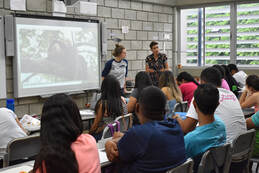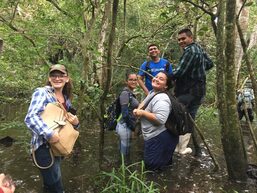Teaching & Diversity Philosophy

Today, there is a crisis of trust in science. When anyone from pop stars to top government officials can take to social media to publicly express their opinions about the validity of scientific findings, and there is no generally accepted authority to correct them, it is more important than ever for students to learn to differentiate between opinions and facts. A recent report from Stanford University’s Graduate School of Education found that college students are terrible at evaluating the quality of online information, which is problematic given that a Google search is more likely to pull up sensational headlines than credible scientific sources. My goal as an educator is to give my students the tools to distinguish facts from alternative facts, confidently mine through data rather than tweets, and critically examine the issues of today, from climate change to border walls, through an anthropological lens. To do this, I teach my students to approach anthropology as both a scientific and an interactive process by focusing not just on what scientists know but how they know it. As a result, my students learn to critically evaluate, expand, and reflect on what they hear and read, necessary skills whether they pursue a career in academia, politics, law, medicine, or business.
In my classes, I prioritize diverse viewpoints, encourage stimulating debates, and work to create an inclusive and supportive learning environment. I teach my students that science isn’t blind to identity, or free from bias, it has just existed for decades with one particular view point in mind. As an educator, and especially as an Anthropologist, I am passionate about promoting identity, rather than stifling it, by integrating diverse viewpoints in my courses, creating a safe space where my students feel comfortable to draw from their own experiences, and providing opportunities and resources for underrepresented students to successfully find their voice and use it.
In my classes, I prioritize diverse viewpoints, encourage stimulating debates, and work to create an inclusive and supportive learning environment. I teach my students that science isn’t blind to identity, or free from bias, it has just existed for decades with one particular view point in mind. As an educator, and especially as an Anthropologist, I am passionate about promoting identity, rather than stifling it, by integrating diverse viewpoints in my courses, creating a safe space where my students feel comfortable to draw from their own experiences, and providing opportunities and resources for underrepresented students to successfully find their voice and use it.
CURRENT COURSES
ANT 200/NBB 201: FOUNDATIONS OF BEHAVIOR
This course investigates evolutionary and biological explanations for animal behavior, including humans. In this course, we will draw from fundamental principles in anthropology, animal behavior, biology, neuroscience, and psychology, to broadly examine: 1) primate evolution and behavior, 2) the principles of evolution and how they relate to animal behavior, 3) basic functional neuroanatomy, and 4) neural and neuroendocrine mechanisms of behavior, with an emphasis on social behavior. By drawing on examples from humans and nonhuman primates, this course places human behavior in the context of that of other species, to better understand why we behave the way we do.
ANT 276: QUEER ANTHROPOLOGY
This course will provide a critical and rigorous examination of sex, gender, and sexuality by delving into the biological underpinnings and evolutionary roots of primate sexual behavior, and the historical and contemporary approaches to understanding the nuance of human sexuality. This course will be co-taught by two queer anthropologists—who specialize in different aspects of biological anthropology—and will combine expertise on evolution, animal behavior, genetics, queer history, and global social movements to provide a comprehensive understanding of the roles of nature, nurture, and culture in shaping human sexuality. This course will tackle several important questions including: How has heterosexuality become normative and hegemonic? Is homosexual behavior widespread in animals? How has homosexuality evolved? How has biology been misconstrued to perpetuate homophobia and societal gender roles? How has cultural bias shaped our understanding of the complexity of sexual behavior across primates? How can a better understanding of both the biological and cultural underpinnings of sexuality inform health, pleasure, joy, equality, identity, and social justice?
ANT 285: FUNDAMENTALS OF PRIMATE BEHAVIOR AND COGNITION
This course will investigate what it means to be a primate by examining the evolution, behavior, and cognition of our closest living relatives. In this course, students will learn the fundamentals of primatology by combining empirical data (what we know), with theory (what we think we know), with the methods we have available to us (how we know it). This course will walk through (1) an overview of the living primates, (2) the problems that primates must solve to survive and reproduce, (3) how primates solve these problems, and (4) how we know how primates solve these problems. While this will be a virtual course, students will learn to critically evaluate primate studies, observe primate behavior through wildlife documentaries and field footage, collect and interpret their own data on primate behavior and cognition, and engage with primatologists through interviews and field narratives.
ANT 302: PRIMATE BEHAVIOR & ECOLOGY
Humans, chimpanzees, gibbons, mandrils, vervets, capuchins, aye-ayes, and more all share a common ancestor. What clusters us together on the evolutionary tree? What sets us apart? This course investigates what it means to be a primate by examining the morphology, behavior, ecology, and cognition of our non-human primate relatives. In this course, we will draw from fundamental principles in anthropology, animal behavior, biology, ecology, and psychology, to delve into 1) the diversity of the primate taxa, 2) the principles of evolution and how they relate to primate behavior, 3) the ecological and social challenges primates face, and 4) the challenges we face in studying and conserving these species in their natural habitats. By drawing on scientific papers, stories from the field, wildlife documentaries, popular articles, podcasts, and interviews with primatologists, this course will challenge you to critically evaluate key theoretical and methodological issues in primate behavior focusing not just on what scientists know but how they know it.
ANT 455/ANT 585: CURRENT TOPICS IN PRIMATE BEHAVIOR
For decades, studies on primate behavior have provided us with a lens to observe our ancestral past. Since the onset of the discipline, primatology has continued to evolve, with the integration of novel methodologies that have placed studies on primate behavior at the forefront of anthropology, social sciences, animal behavior, psychology, and medicine. This seminar focuses on the past, present, and future of primatology by examining both the theoretical roots of the discipline and the groundbreaking studies that address current problems in the fields of primate behavior and primate cognition. By comparing current novel studies with “old” seminal scientific papers, this course will challenge you to understand historical perspective, consider theoretical advances, examine methodological approaches, and critically assess the future trajectories of primatology. **This class is an advanced undergraduate/graduate seminar**.
Coming SOON: Field SchoolCurrently, we establishing an international field school and study abroad program at the Taboga Forest Reserve in Costa Rica to teach undergraduates research methods and provide invaluable field research experience. In collaboration with la Universidad Técnica Nacional (UTN) in Costa Rica, and Drs. Jacinta Beehner and Thore Bergman at the University of Michigan, we are developing an effective, interdisciplinary curriculum where undergraduate students from US institutions and UTN will work together on projects related to animal behavior, anthropology, psychology, ecology, and conservation.
|
PAST COURSES
ANTHRBIO 297: UNDERSTANDING THE SOCIAL MIND
Why are humans so smart? One promising hypothesis suggests that the large and advanced cognitive abilities in humans, and our primate relatives, evolved as a response to the challenges associated with living in large and complex social groups. Many aspects of human nature from friendship to deception, fairness to discrimination, language and morality, likely evolved to help us successfully navigate our intricate social networks. Yet humans are not alone in having a social mind, our closest primate relatives also deal with the pressures of living in social groups. What socio-cognitive abilities do we share with non-human primates and other social animals? What aspects make the human mind so unique?
GRADUATE STUDENT INSTRUCTOR
ANTHRBIO 161, Introduction to Biological Anthropology, Fall 2010
ANTHRBIO 364, Evolution & Nutrition, Winter 2011
ANTHRBIO 161, Introduction to Biological Anthropology, Fall 2012
ANTHRBIO 201, Introduction to Biological Anthropology, Winter 2016
ANTHRBIO 364, Evolution & Nutrition, Winter 2011
ANTHRBIO 161, Introduction to Biological Anthropology, Fall 2012
ANTHRBIO 201, Introduction to Biological Anthropology, Winter 2016
